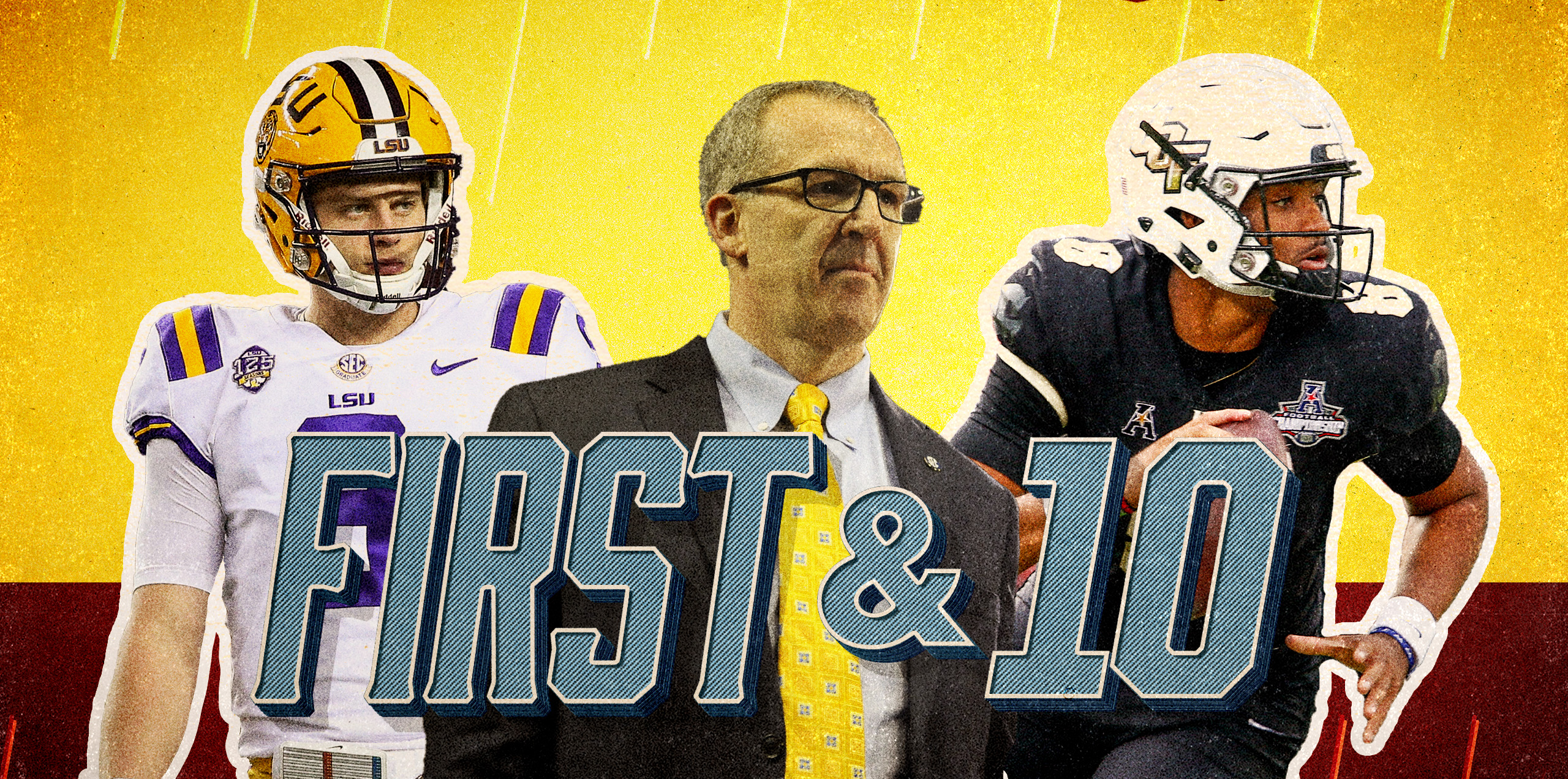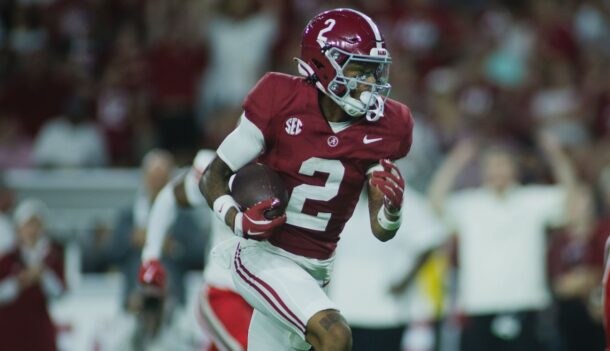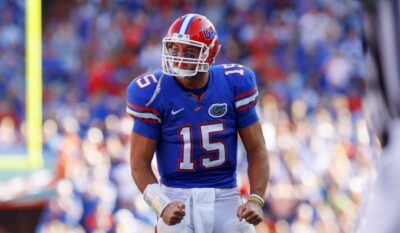
First and 10: It’s not just LSU vs. UCF. It’s the SEC vs. UCF, with reputations at stake
By Matt Hayes
Published:
1. I don’t want to get on a soapbox, but …
The line has been drawn, and now everyone in the SEC is on the hook.
If you thought LSU coach Ed Orgeron made a statement when he boldly declared the Tigers are all in on the Fiesta Bowl against UCF, SEC commissioner Greg Sankey took it a step further late last week when he publicly paddled UCF for its scheduling problems in relation to the College Football Playoff.
Sankey said UCF should look “inward” when addressing issues of its failure to land quality Power 5 nonconference opponents, just like the SEC looked “inward” when it realized its basketball nonconference scheduling was impacting NCAA Tournament hopes and it had to upgrade.
He better hope LSU beats UCF – or this will blow up in the face of everyone in the SEC.
“Rather than point to the selection committee, other people … we looked inward and said how do we adjust to the circumstances around us?” Sankey said during the Learfield Intercollegiate Athletics Forum.
Because, as we all know, you can’t tell the difference between football and basketball scheduling without a scorecard.
Here’s the problem with the “inward” argument: It’s patently ridiculous to transpose to football – and frankly, absurdly disingenuous.
Let me be clear: Sankey is the sport’s top commissioner, a proactive tactician whose thoughtful and measured responses to all things controversial or debatable are critical in an age of reactionary choice.
But he stepped in it last week.
Sankey knows as well as anyone the differences between scheduling football and basketball. He knows when UCF athletic director Danny White says it’s hard to find Power 5 schools (including the SEC) who will agree to a home-and-home series, he’s dead-on accurate.
He knows that despite Missouri and South Carolina playing recent home-and-home series with UCF, it’s not quite the same since UCF’s 25-game winning streak, and since its argument to be included in the College Football Playoff.
He also knows that there’s no chance in hell SEC blue bloods (no offense, Mizzou and USC) will agree to a home-and-home with UCF. And this leads us to the Fiesta Bowl on New Year’s Day.
Sankey better hope LSU beats UCF – or this will blow up in the face of everyone in the SEC.
If UCF does what it did the past two times the BCS/CFP allowed it into the big boy postseason (beat Baylor and Auburn), the SEC might as well get ready for nine months of UCF pointing the last year’s Peach Bowl win over Auburn and a Fiesta Bowl win over LSU as the exact reason the SEC wants no part of scheduling UCF – even though it’s, for the most part, a fiscal argument (more on that later).
In this day and age of social media and everyone more visual than visceral, that’s a bad, bad look for the SEC.
Sort of like the bad look Jim Delany laid on the Big Ten after the 2006 BCS National Championship Game. After Florida humiliated Ohio State – the first of seven consecutive national titles for the SEC – Delany was miffed how the public debate had shifted to the SEC’s dominance of the Big Ten and decided to write an open letter (really, he did) to Big Ten fans on the Big Ten website.
If the idea itself wasn’t bad enough, the execution was atrocious. Delany came off looking like a petulant message board fanboy, using over the top statements that simply weren’t true.
“I wish we had six teams among the top 10 recruiting classes every year, but winning our way requires some discipline and restraint with the recruitment process,” the letter read. “Not every athlete fits athletically, academically, or socially at every university. Fortunately, we have been able to balance our athletic and academic mission so that we can compete successfully and keep faith with our academic mission.”
While Sankey didn’t go that far, he clearly took a shot at White and UCF while defending his league.
Now he has to hope LSU – which will be without starting cornerbacks Greedy Williams (leaving early for NFL) and Kristian Fulton (injured), and middle linebacker Jacob Phillips (targeting) for the first half – plays big against a lethal and prolific UCF offense.
The game was tough enough for LSU: a talented and fast UCF team has all the motivation of preserving the winning streak, a CFP snub (again) and proving doubters wrong.
Then Sankey came in and threw kerosene on a hot oil fire.

2. Breaking down the argument
The scheduling argument isn’t about a fear of losing, it’s about the potential to lose control on numerous levels: the game, recruiting and access to CFP – to name a few.
Florida athletic director Scott Stricklin said last week he’d play UCF if the Gators get two home games for the Knights’ one. White doesn’t want that, and says UCF has established itself to deserve a one-for-one deal.
Realistically, if UCF hasn’t yet established itself to get those deals with the SEC, when will it? Florida recently agreed to a two-for-one with USF, and it might as well have been highway robbery.
The Gators are paying $750,000 for two games in Gainesville (total, not each) and receiving $250,000 (and 12,000 tickets; about 4-6,000 above typical road games) for the game in Tampa. That’s a net of at least $1 million over the three seasons because guarantee games typically costing Power 5 schools at least $750,000.
Here’s another reason Florida is playing at USF: the Bulls play in an off-campus, NFL stadium, and the 2023 USF home game will likely be at least half-full of Gators fans.
Meanwhile, a potential road game for Florida at UCF and its 40,000-seat on-campus facility (if Florida even agreed to play there instead of the Citrus Bowl in downtown Orlando) would be a distinct UCF advantage.
That’s simply the logistics of the deal. We haven’t even mentioned what the actual game (and a loss) could do to Florida (or any other SEC team). Or what impact it could have on a Group of 5 team wedging its way into the CFP.
Because if a Group of 5 team gets in, that’s one fewer spot for the Power 5 conferences – and one less chance for the SEC to land two spots in the CFP.
A loss to UCF also damages Florida (or any other SEC team) in recruiting against UCF, which has tremendous facilities, a booming campus life (the largest public enrollment in the country) and a thriving city as a backdrop.
You better believe there is much to lose for SEC teams well beyond the playing field. But to that end, there’s also one big incentive: establishing pecking order (which, really, is already there, anyway).
3. The scheduling numbers game, The Epilogue
The SEC plays 8 conference games and has 4 nonconference games, and that will never change. The schools need a minimum of seven home games a season to cover large athletic department budgets.
That’s not a talking point, that’s fiscal reality.
All but two SEC teams are guaranteed 4 SEC home games a season (Florida and Georgia play annually in Jacksonville), and Florida, Georgia, South Carolina and Kentucky play annual nonconference games against state rivals. So that leaves little wiggle room in scheduling.
If you’re UCF, the other 10 schools are your best bet for figuring out a nonconference contract. There’s no excuse for any of the 10 – including blue-bloods Alabama, Auburn, LSU and Tennessee – to not agree to a deal.
One SEC athletic director told me the best way for UCF to land a true one-for-one contract is to land a title sponsor for the UCF home end of the deal, and guarantee what would amount to a home game payday (around $2-3 million).
White doesn’t think UCF should have to do that, and points to future home-and-home contracts the Knights have secured: Stanford (plays at UCF in 2019), Louisville and Georgia Tech, as well as previous home-and-homes with Maryland, N.C. State, Boston College and Penn State (UCF sold its home game to Ireland when Penn State threatened to buy out the game and play UCLA).
Bottom line: We’re at a standoff, and the SEC isn’t budging. For now, the SEC can stand on the idea of fiscal responsibility.
If UCF beats LSU, the narrative strictly becomes avoiding the Group of 5 team that can beat you.
4. The Heisman choice
Tua Tagovailoa didn’t win the Heisman Trophy, and the vote wasn’t close. This, of course, leads to the inevitable and uncomfortable question:
Would Alabama be unbeaten and ranked No.1 in the nation without Tagovailoa? If you say anything other than yes, you’re being intellectually dishonest.
Want to know why Tagovailoa, a lock for the Heisman for every week of the season but the last, didn’t win the greatest individual award in amateur sports? Because Jalen Hurts beat Georgia in the SEC Championship Game.
Like it or not, fair or not, Tagovailoa lost the Heisman because he sustained a high ankle sprain early in the game that eventually forced him to leave. That led to Hurts’ magical comeback story – and suddenly, Tagovailoa didn’t seem like the Superman of yester-weeks.
But get this: Had Tagovailoa stayed in the game and led a stirring comeback, he would have won the award. It would have been nearly impossible to vote against a player who had dominated all season, and who led his team from behind in the biggest game of the season with everything on the line.
Instead, Hurts did it — and that let doubt creep into the minds of Heisman voters, and completely minimized what Tagovailoa did prior to the SEC Championship Game.
5. The Weekly Five
Five years where we could have had different Heisman Trophy winners were the award named after the bowl season (not including this season):
- 2016: Deshaun Watson, Clemson (instead of Lamar Jackson, Louisville)
- 2014: Ezekiel Elliott, Ohio State (instead of Marcus Mariota, Oregon)
- 2011: Andrew Luck, Stanford (instead of Robert Griffin III, Baylor)
- 2008: Tim Tebow, Florida (instead of Sam Bradford, Oklahoma)
- 2005: Vince Young, Texas (instead of Reggie Bush, USC).
6. Motivation is a good thing
Nick Saban’s teams work best with motivation based on a perceived slight. We’ve seen it time and again.
While Tagovailoa’s loss of the Heisman didn’t sit well with anyone at Alabama, it did give the Tide a point of focus and a perceived slight for the College Football Playoff run. Over and over in Saban’s 12 years in Tuscaloosa, the best Alabama teams are the ones with something to play for:
2009: Lost the 2008 SEC Championship Game to Florida after Tebow threw his three third down touchdown passes, then got embarrassed by Utah in the Sugar Bowl. The 2009 team beat Tebow and No. 1 Florida in the SEC title game, then took out No. 2 Texas to finish 14-0.
2011: A 9-6 overtime loss to LSU in the regular season was vanquished in the BCS National Championship Game rematch.
2012: A loss in Tuscaloosa to Texas A&M (and the narrative that Alabama didn’t deserve another break by the BCS) resulted in another national title.
2015: Losing to Ohio State in the 2014 College Football Playoff, and an early-season loss to Ole Miss that created the idea of Saban’s program in decline. They responded by beating Clemson in the title game.
2017: The last-second loss to Clemson in the 2016 National Championship Game, and the narrative that Alabama didn’t win its own division yet advanced to the CFP.
7. The quarterback question
Kenny Dillingham is Auburn’s new offensive coordinator, and this means absolutely nothing.
If Gus Malzahn is to survive on The Plains, he has to find lightning in a bottle again (Cam Newton, Nick Marshall) at the most important position on the field.
There’s no one on the Auburn roster – or committed recruits (sorry, Bo Nix fans) – that can make it happen in one season. There is, however, a possible graduate transfer that checks every box: Arizona’s Khalil Tate.
When Tate was asked after Arizona’s regular-season final loss to Arizona State if he would be returning in 2019, he told the Arizona Daily Star, “Next question.”

Tate hasn’t addressed his future since the loss, and has three options: stay at Arizona, declare for the NFL or transfer to another program as a graduate without a transfer penalty.
It speaks volumes that he hasn’t spoken since that postgame. He could easily have cleared the air and announced he was staying at Arizona.
Or he can wait to see who leaves early for the NFL, and where he’d fit best.
Tate isn’t ready for the NFL, so that option is out. His relationship with Arizona offensive coordinator Noel Mazzone was strained at times, even though his passing numbers improved dramatically from 2017. Tate wanted to become more of a thrower, but not at the expense of all but eliminating his dynamic ability in the run game.
An ankle injury for much of the season limited what Arizona could do in the run game with Tate, and the game’s most dangerous quarterback had season highs in carries (13) and yards (46) well off the video game numbers he put up in 2017.
A healthy Tate in a system built around his skills could be critical for Malzahn’s crossroads season in 2019.
8. Ask and you shall receive
Matt: What do you think Justin Fields will do after this season? My brother thinks he’s long gone, I think he’s loyal to Georgia and he stays. Not everyone plays early.
Carey Robertson
Valdosta, Ga.
Carey: Georgia made it clear time and again in 2018 that Jake Fromm is its quarterback, now and in the future.
Here’s a simple way of looking at the decision of staying or going: If he stays, he’ll be limited in playing time behind Fromm. If he leaves, he has to sit out a year.
A compromise: begin next season with the idea of playing only four games and try to redshirt. If Fromm leaves for the NFL after his junior season, Fields has three years of eligibility if he doesn’t play more than four games in 2019.
That all sounds well and good, but we all know elite quarterbacks and their desire to play. Even though he wouldn’t be eligible to play until 2020 if he transfers, Fields could leave if he feels as though he wasn’t given a legitimate opportunity to win the job.
My guess is he stays, because with the new redshirt rule, there’s more value in staying – as long as his relationship with the staff is still strong. If it’s not, he’ll leave after the bowl game.
9. Numbers game
11. We’re 10 days from the Early Signing Period (Dec. 19-21), and if you want to know why the SEC is annually the strongest conference in college football, look no further than recruiting rankings.
In the latest 247Sports.com rankings, 11 of the top 21 teams – including the top four (Alabama, Texas A&M, Georgia, LSU) – are from the SEC. Only Vanderbilt (No. 51) is outside the Top 50.
10. Quote to note
Alabama coach Nick Saban on staff continuity: “I always look at it as a challenge and an opportunity to add new energy, new enthusiasm, new ideas to your staff.”
Matt Hayes is a national college football writer for Saturday Down South. You can hear him daily from 12-3 p.m. on 1010XL in Jacksonville. Follow on Twitter @MattHayesCFB







